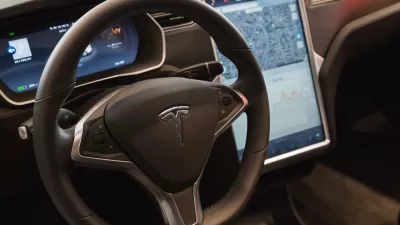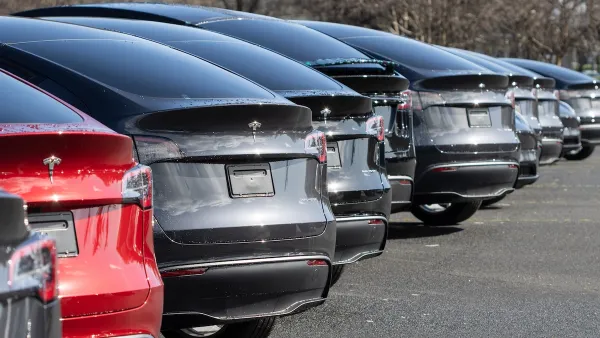In the wake of multiple fatal crashes involving Tesla's self-driving mode, ethicists suggest the need for a robust set of regulations governing the testing of AVs before more of them hit the road.

Tesla, which "has been offering customers access to a 'Full Self Driving' beta software, allowing Tesla owners to effectively become guinea pigs for the company's tech" for years, "is now under investigation by the National Highway Traffic Safety Administration (NHTSA) for several crashes where the Autopilot system was engaged." James McCandless reports on new research "that explores the intersection of human behavior and automated driving features in production and future vehicles."
According to Dr. Bryan Reimer, research scientist at the MIT Center for Transportation, "the push towards autonomous driving is a balancing act between what autonomous vehicles can do versus what a driver is capable of doing in conjunction with that technology. The goal is to take some of the more routine driving tasks out of the hands of the driver." Because humans, by nature, tend to become over-reliant on automation, "Reimer says that autonomous systems should be seen as a collaborative part of driving in helping drivers make moment-to-moment decisions." But drivers using Tesla's Autopilot and Full Self Driving modes "have become less attentive on average," leading to the multiple crashes seen in the last year. To Reimer, these repeated incidents raise ethical questions about the efficacy of 'self-driving' modes. "Once we understand a situation," he says, "it becomes foreseeable misuse." Reimer suggests a more cautious approach to autonomous testing and a need for "third-party validated scientific data."
"[T]he uneven nature of autonomous vehicle testing is partly down to the absence of a relevant regulatory environment." According to Reimer and Dr. Nicholas Evans, professor of philosophy at University of Massachusetts-Lowell, autonomous cars need "a regulatory body similar to the Food and Drug Administration (FDA) that can oversee the development of these technologies and insure that they're being safely tested and used."
The benefits of increased oversight, says Evans, "outweigh any reductions of speed in testing cycles," and "there should be more dialogue about the ethical implications of who is affected by more self-driving vehicles on the road and the unintended consequences."
FULL STORY: Ethical Standards for Self-Driving Car Testing Are Still in Their Beta Stage

Maui's Vacation Rental Debate Turns Ugly
Verbal attacks, misinformation campaigns and fistfights plague a high-stakes debate to convert thousands of vacation rentals into long-term housing.

Planetizen Federal Action Tracker
A weekly monitor of how Trump’s orders and actions are impacting planners and planning in America.

In Urban Planning, AI Prompting Could be the New Design Thinking
Creativity has long been key to great urban design. What if we see AI as our new creative partner?

King County Supportive Housing Program Offers Hope for Unhoused Residents
The county is taking a ‘Housing First’ approach that prioritizes getting people into housing, then offering wraparound supportive services.

Researchers Use AI to Get Clearer Picture of US Housing
Analysts are using artificial intelligence to supercharge their research by allowing them to comb through data faster. Though these AI tools can be error prone, they save time and housing researchers are optimistic about the future.

Making Shared Micromobility More Inclusive
Cities and shared mobility system operators can do more to include people with disabilities in planning and operations, per a new report.
Urban Design for Planners 1: Software Tools
This six-course series explores essential urban design concepts using open source software and equips planners with the tools they need to participate fully in the urban design process.
Planning for Universal Design
Learn the tools for implementing Universal Design in planning regulations.
planning NEXT
Appalachian Highlands Housing Partners
Mpact (founded as Rail~Volution)
City of Camden Redevelopment Agency
City of Astoria
City of Portland
City of Laramie





























